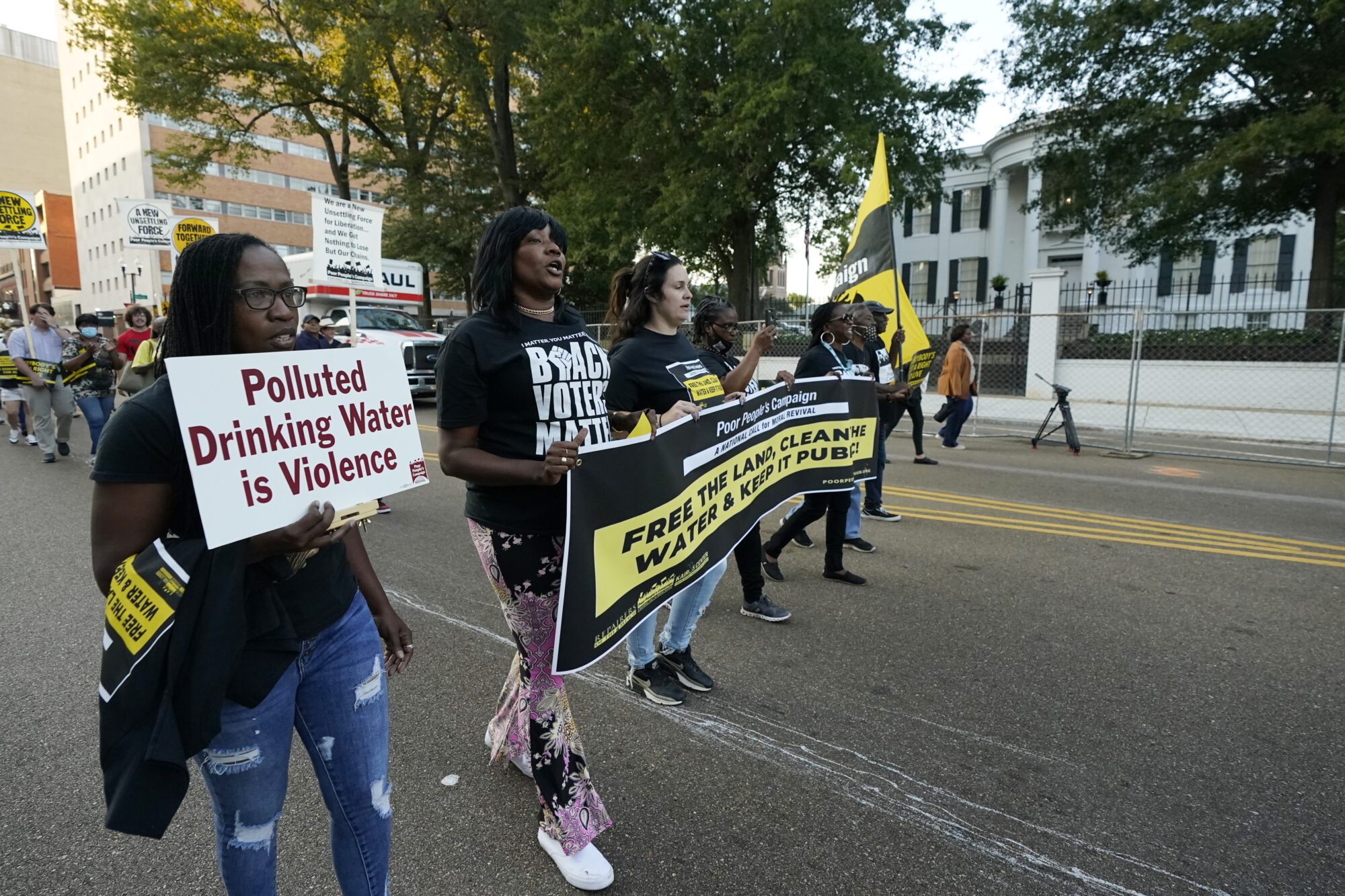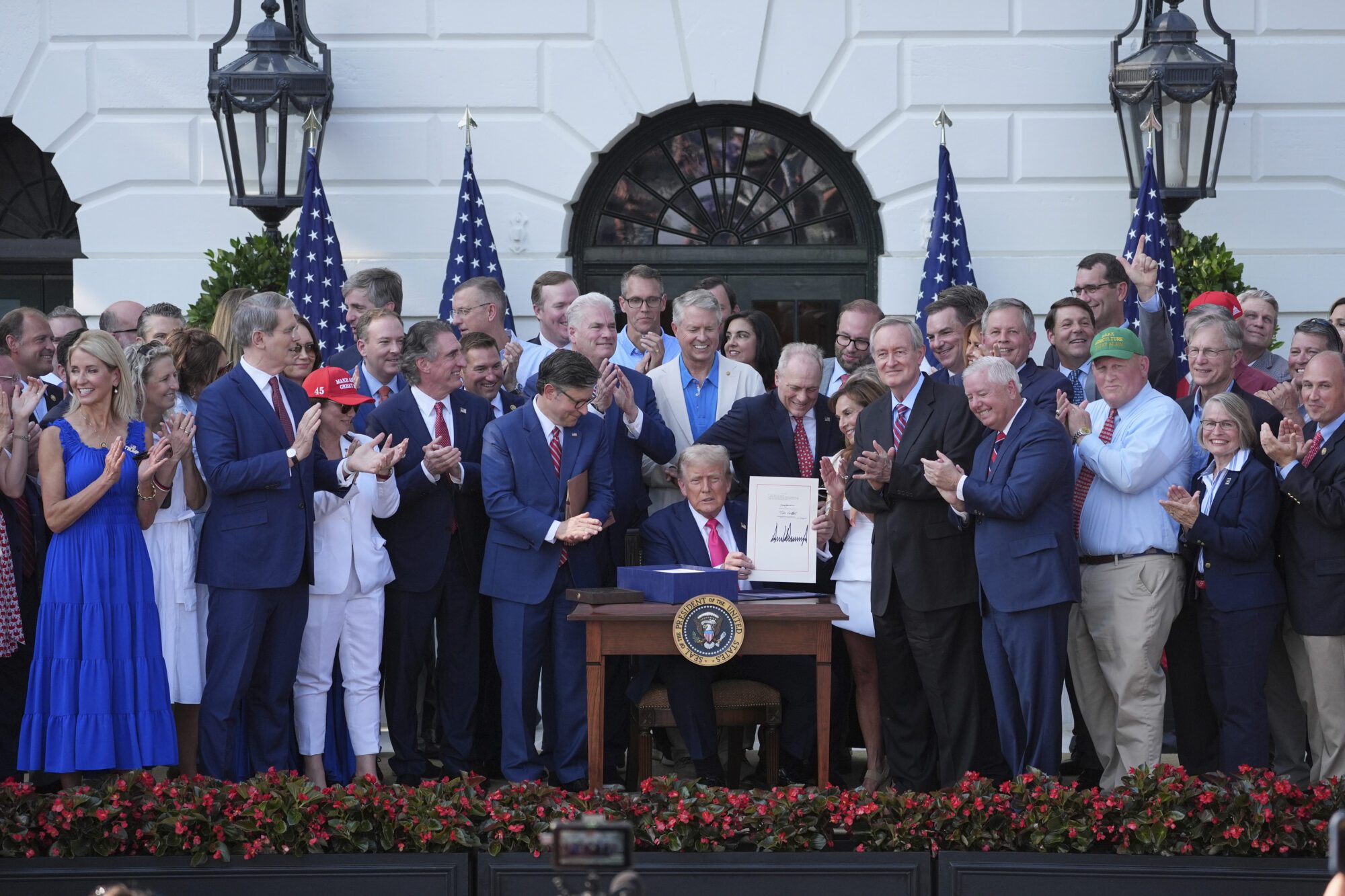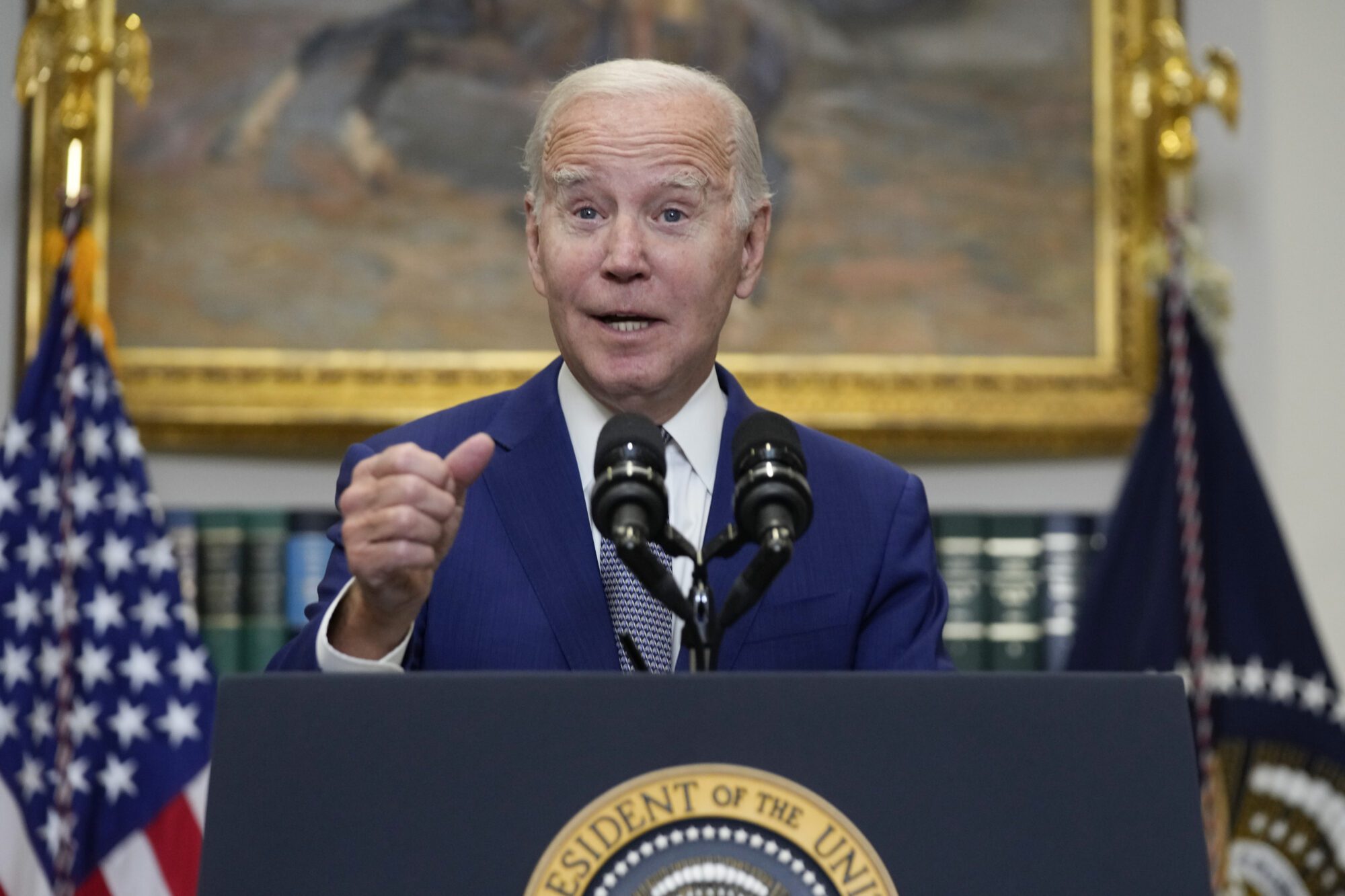
Jackson residents and supporters march with members of the Poor People's Campaign of Mississippi to the Governor's Mansion in Jackson, Miss., to protest water system problems, poverty and other issues, Oct. 10, 2022. (AP Photo/Rogelio V. Solis, file)
State Sen. Joey Fillingane, the author of the bill, says public safety is at the forefront of the section in question in the new law.
Last week, a lawsuit was filed on behalf of the Mississippi Poor People’s Campaign, JXN Undivided Coalition, People’s Advocacy Institute, Black Voters Matter, Rukia Lumumba, Danyelle Holmes, and Arekia Bennett-Scott, arguing that a new state law would restrict freedom of speech in Mississippi.
The complaint argues that Section 1(6)(c) of Senate Bill 2343, which amends Miss. Code Ann. 45-1-19, is an “unconstitutional prior restraint that does not further a constitutionally sufficient or permissible government purpose.”
Approved by Mississippi Governor Tate Reeves at the end of April, that section of S.B. 2343 states:
Written approval from the Chief of the Capitol Police or the Commissioner of the Department of Public Safety shall be required before any event occurs which will take place on any street or sidewalk immediately adjacent to any building or property owned or occupied by any official, agency, board, commission, office or other entity of the State of Mississippi, or which can reasonably be expected to block, impede or otherwise hinder ingress thereto and/or egress therefrom. The Department of Public Safety shall promulgate rules and regulations to effectuate the provisions of this paragraph (c).
The plaintiffs claim the new law is an affront to their First Amendment rights.
“This lawsuit is brought by organizations and citizens of Jackson who have peacefully protested in the past on sidewalks and streets adjacent to state government buildings and intend to do so again in the future, including soon after this new written permission requirement takes effect on July 1, 2023,” the complaint continues. “They seek declamatory relief and a preliminary permanent injunction to prevent its enforcement.”
The lawsuit was filed by attorneys for the Mississippi Center for Justice and the MacArthur Justice Center at the University of Mississippi School of Law.
The lawsuit was filed against Sean Tindell, in his official capacity as Commissioner of the Mississippi Department of Public Safety (DPS), and Bo Lucky, in his official capacity as Chief of the Capitol Police, a unit of the Mississippi DPS.
Attorneys for the plaintiffs wrote that the challenged law requires the written permission of Tindell or Luckey (or their successors) before a protest is conducted on a street or sidewalk adjacent to a building owned or occupied by state government officials. They argued that the actions of the defendants and their agents to effectuate the challenged law would be state action and undertaken under color of state law.
The plaintiffs also state that Senate Bill 2343 violates the Equal Protection Clause of the Fourteenth Amendment to the U.S. Constitution which provides that, “No State shall…deny to any person within its jurisdiction the equal protection of the laws.”
Certain aspects of this law violate the Equal Protection Clause as well as the First Amendment because the law unjustifiably treats similarly situation speech differently. It targets speech directed toward and against the state government and state officials; it imposes burdens on speech on streets and sidewalks adjacent to state-occupied buildings not imposed on other streets and sidewalks; and to the extend it burdens speech adjacent to state-occupied buildings in Jackson and not elsewhere in Mississippi.
In the Memorandum, the plaintiff’s state that the strength of First Amendment protection against government intrusion is at its height when speakers stand on public sidewalks and streets.
“This year, Mississippi made illegal peaceful protests on public sidewalks and streets next to state government buildings in Jackson without prior written permission from state officials. Noncompliance may be punished with a prison sentence, even if the demonstration was duly permitted by the City of Jackson,” the plaintiffs contend. “This chills Plaintiffs’ protected speech activities and does not further a substantial or compelling government purpose that is unrelated to suppressing speech. It unjustifiably burdens their First Amendment freedoms of assembly, association, petition, and the free exercise of religion, and it violates their rights under the Fourteenth Amendment Equal Protection and Due Process Clauses.”
The conference report for S.B. 2343 passed the Mississippi State Senate this past session by a vote of 29-14 and the House by a vote of 74-41.
State Senator Joey Fillingane, author of the legislation, said he doesn’t agree with those who are opposing the new law. He explained that the Capitol Complex Improvement District (CCID) is based loosely on the District of Columbia, “the federal district that’s been in existence for very many years in our nation’s capital.”
“And I believe, if you’re going to have a larger protest on the National Mall, or certainly in front of the White House, or in front of Congress, or the Supreme Court, there are certainly restrictions on when, and how, and what type of protest you can engage in,” Senator Fillingane said. “Now it doesn’t say you cannot protest; it doesn’t take away your right to protest. So, I think the lawsuit is poorly timed because I really don’t think, at least to my knowledge, there have been any applications for a protest in any of these areas that have been denied.”
Senator Fillingane stated that he’s “not offering legal advice to anyone,” but if individuals were to claim a violation of their constitutional right, there has to be evidence of that damage. He explained that the damage would be applying for a protest and then being wrongfully denied the opportunity to protest.
Fillingane said public safety is what was at the forefront of the section of the new law in question.
“Public safety is the driving force behind that section of the law because you have multiple groups on opposite sides of the issue protesting at the same time, at the same place, things can get out of hand. The law enforcement needs to have prior knowledge of that so they can beef up their security presence to accommodate all of the protestors and to ensure public safety,” Senator Fillingane said. “It’s not an issue of anyone being denied the ability to protest in front of any of the state buildings, it’s merely a factor of trying to allow our public safety, law enforcement community to be aware ahead of time so that they can have the proper security measures in place to ensure the protestors’ safety, the public’s safety, and everyone involved.”











